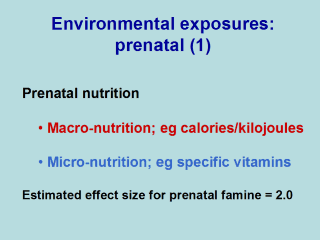| front |1 |2 |3 |4 |5 |6 |7 |8 |9 |10 |11 |12 |13 |14 |15 |16 |17 |18 |19 |20 |21 |22 |23 |24 |25 |26 |27 |28 |review |
 |
One possible risk factor underlying the
previously discussed proxies is nutrition. There has been recent interest in
the impact of suboptimal prenatal nutrition in a critical period of brain
growth on (a) various adult-onset disorders (the so-called “Barker
Hypothesis”); (b) birth anomalies such as the association between low
maternal periconceptual folate and neural tube defects in their offspring;
and (c) impaired functional compensation in those sustaining an earlier
brain insult. Since the role of diet in crucial phases of development can
have important neurological consequences for the offspring, by inference
prenatal nutritional deprivation is a biologically plausible risk factor for
schizophrenia. While studies of the incidence of schizophrenia in developing nations (where more fetuses are exposed to poor nutrition) do not appear to show higher rates, there remains the possibility that deficits in specific micronutrients may play a role. Increased risk of schizophrenia has been identified in the offspring of women who were pregnant during a famine in Holland during World War II. Prenatal famine has also been associated with a twofold increased risk for schizoid or schizotypal personality disorders and other neurological-developmental disorders (eg neural-tube defect). Further indirect evidence of a nutritional effect is suggested by findings that low maternal late-pregnancy Body Mass Index (BMI) (as well as the infant’s low weight at birth and during infancy) is associated with a higher risk of schizophrenia. Recently, low prenatal vitamin D has been proposed as a candidate risk factor for schizophrenia. Vitamin D (also considered a steroid hormone) is primarily synthesized from the effect of sunlight on the skin and secondarily from diet. Hypovitaminosis is relatively common. Low maternal vitamin D may adversely effect many aspects of growth, but especially the developing foetal brain, leaving the affected offspring at increased risk of developing schizophrenia. |